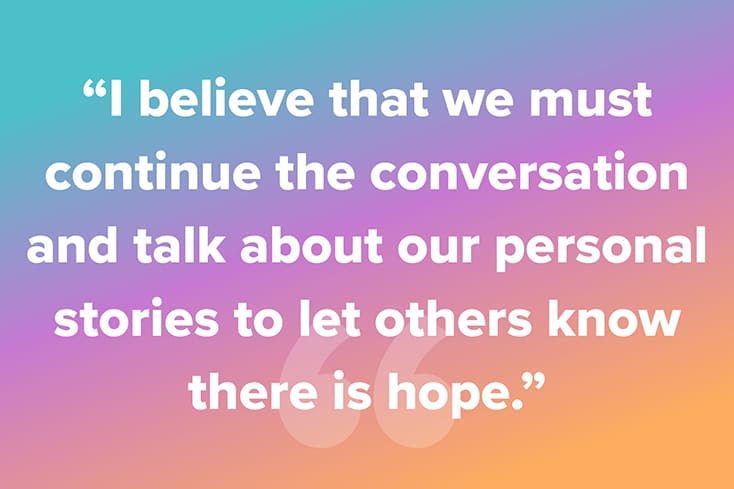November 18, 2021
By Jonée Shady

When my mother passed away suddenly in 1998, I was left to be brother’s sole caretaker. He had been diagnosed with schizophrenia in his early 20s, but he did not accept his diagnosis and spent most of his adult life in the criminal justice system.
As my brother’s release date approached, I knew I had to prepare myself for getting him the proper care. I recalled how my mother had struggled find the right help and support — the stress in her voice, the constant phone calls detailing terrible incidents that took place at the height of my brother’s symptoms.
When I was going through my mother’s possessions, I came across a resource booklet from NAMI Orange County. I immediately recalled the time she told me that she had found a support group at NAMI and was so grateful to discover that she was not alone. I knew I would benefit from this kind of support; I looked online and found NAMI’s Family-to-Family course designed for family members, significant others and friends of people with mental health conditions.
This course changed my life. I was able to get a clear understanding of what it means to have schizophrenia, to fully process the trauma that family members go through while trying to understand and help their loved one and to prepare for the level of advocacy needed to get proper treatment for their loved one. I also had a chance to reflect on the amount of work we, the mental health community, have ahead of us in ensuring that people with mental health conditions can build better lives.
I have gone on to train as a NAMI Family-to-Family Teacher, a Support Group Facilitator and a Provider Educator. I have taught 12 courses and run support groups for over five years at my local affiliate, NAMI Glendale. I am also a state trainer for all three programs, and I am so proud of the work that I have done and continue to do with NAMI. I love the NAMIWalks event and have participated every year, not only raising needed funds, but also raising awareness about mental health.
I believe that we must continue the conversation and talk about our personal stories to let others know there is hope — and that our loved ones are entitled to live a quality life free of stigma. I have accepted that my brother may always reside at an inpatient facility, but because of NAMI, I am able to understand what he is going through with compassion and understanding.
Moreover, I will continue to advocate for him and others who are unable to advocate for themselves. I will never give up hope, and I will continue to spread NAMI’s mission in my everyday life.
We’re always accepting submissions to the NAMI Blog! We feature the latest research, stories of recovery, ways to end stigma and strategies for living well with mental illness. Most importantly: We feature your voices.
LEARN MORENAMI HelpLine is available M-F, 10 a.m. – 10 p.m. ET. Call 800-950-6264,
text “helpline” to 62640, or chat online. In a crisis, call or text 988 (24/7).